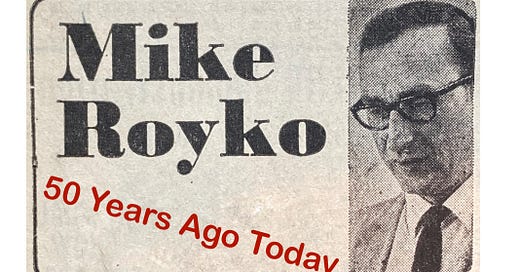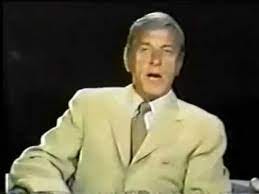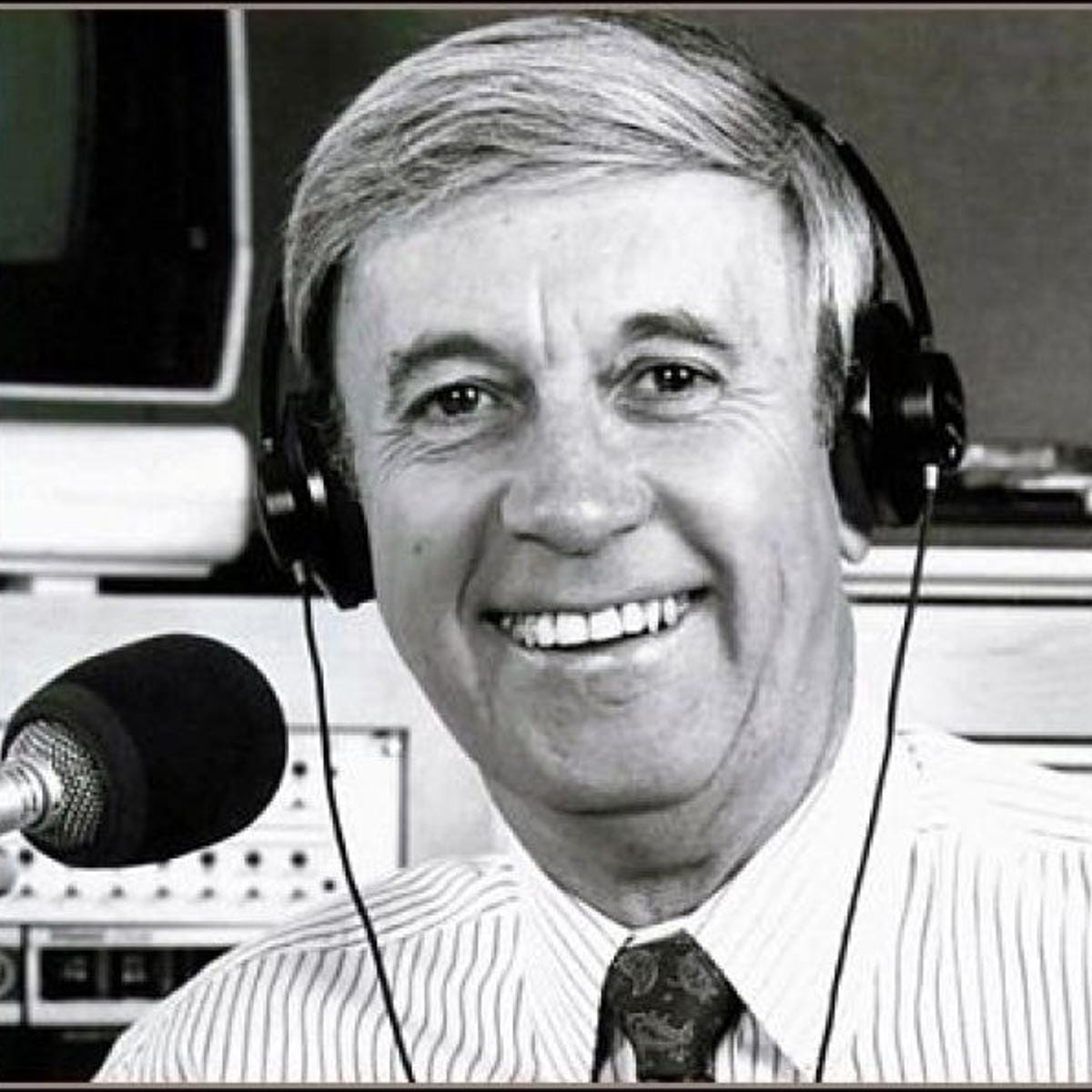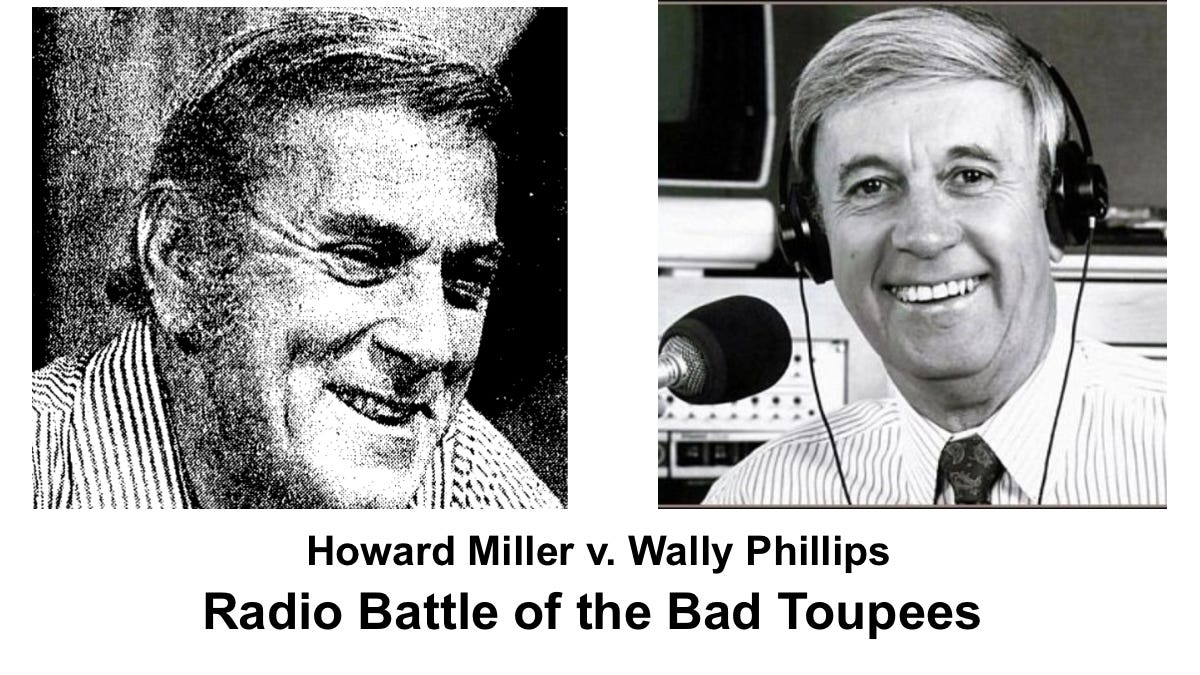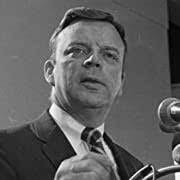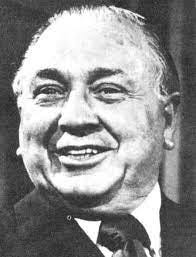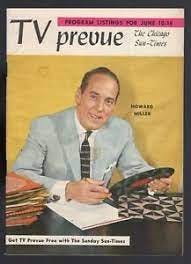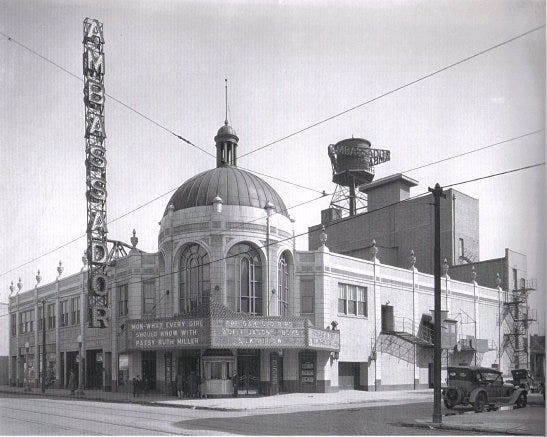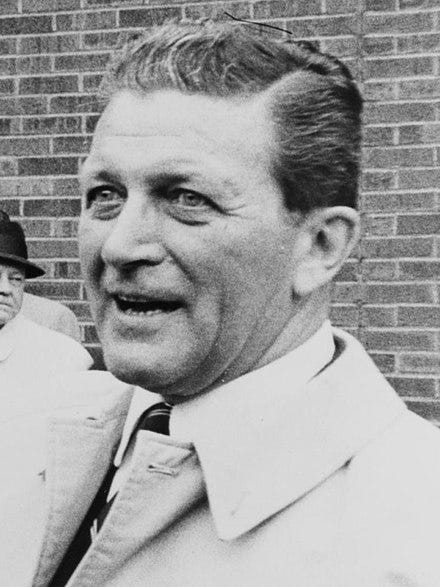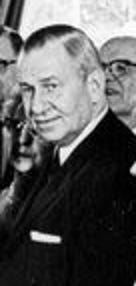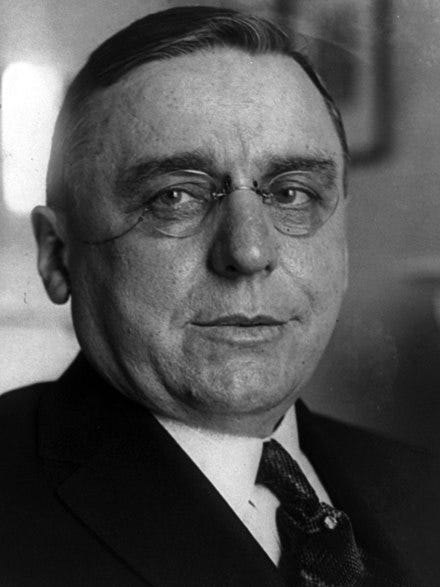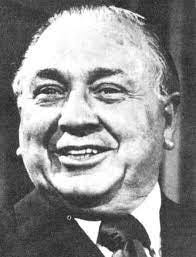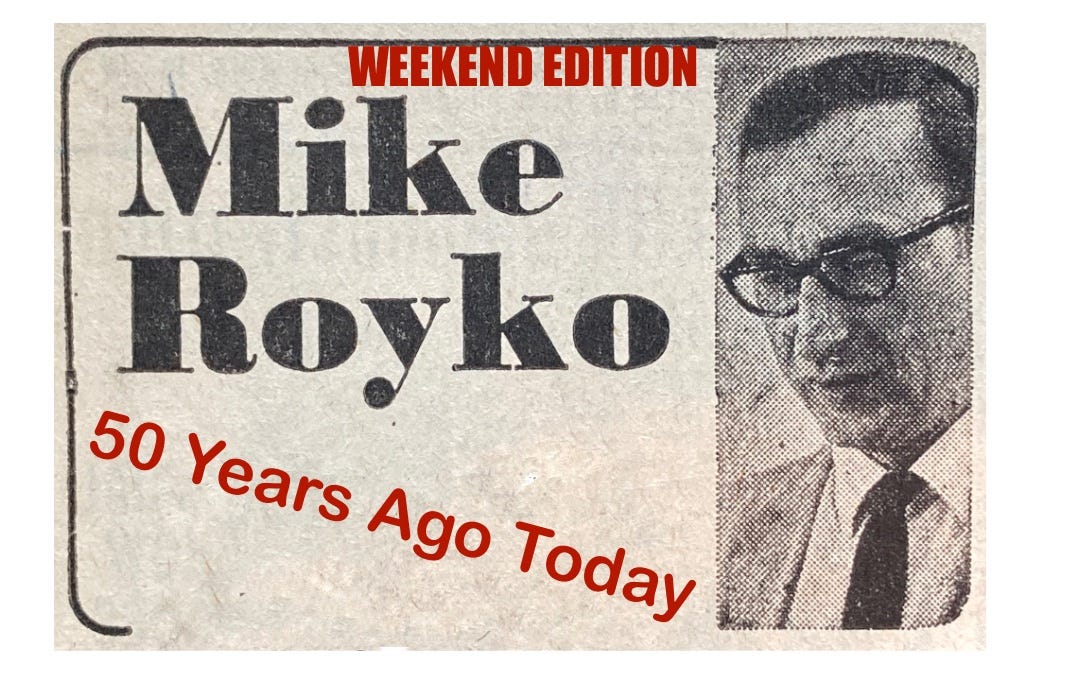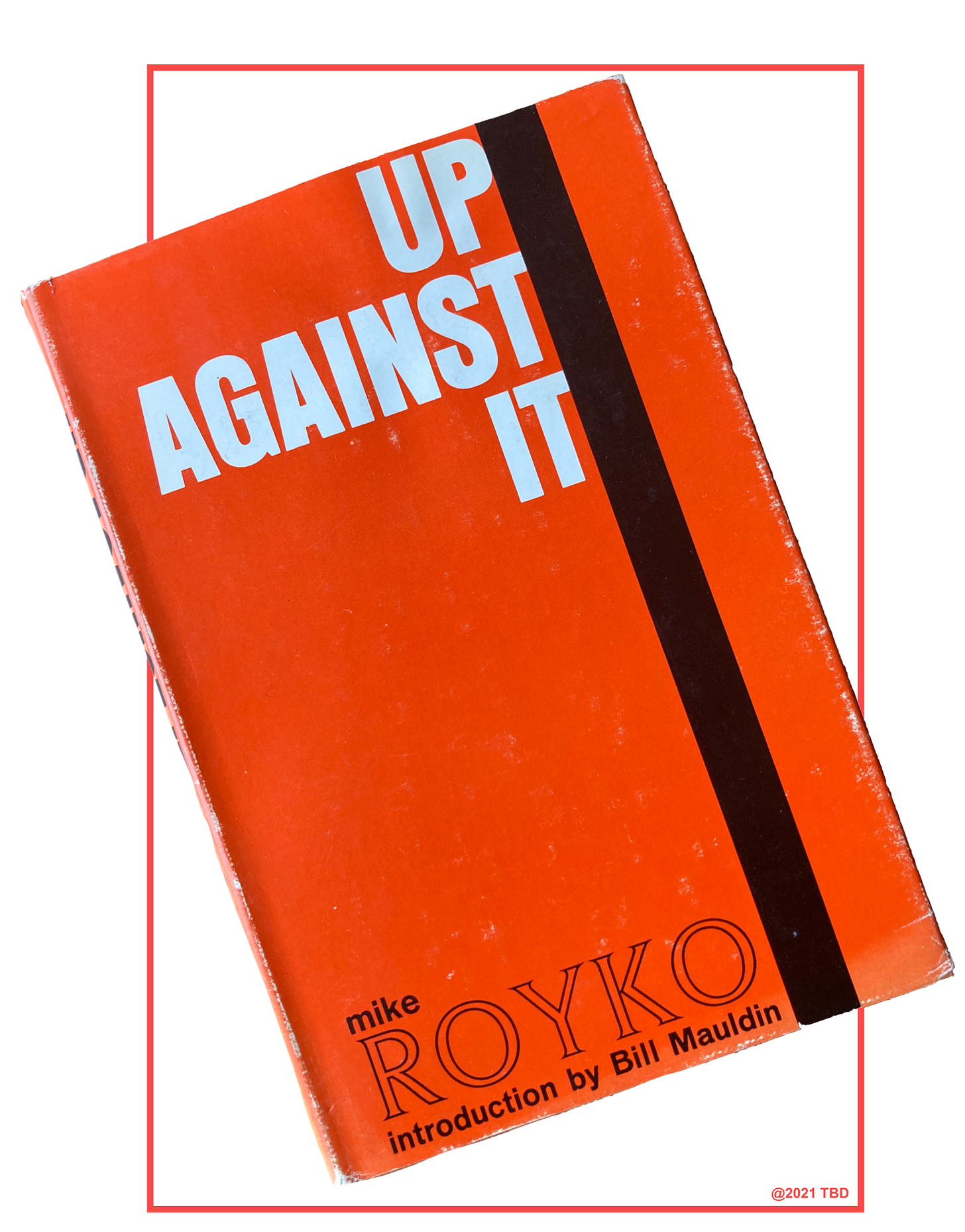Mike Royko 50 Years Ago Today: Oh my God, it's time to talk about Howard Miller.
December 13-19, 1971
Why do we run this separate item, Mike Royko 50 Years Ago Today? Because Steve Bertolucci, the hero of the serialized novel central to this Substack, “Roseland, Chicago: 1972,” lived in a Daily News household. The Bertolucci’s subscribed to the Daily News, and back then everybody read the paper, even kids. And if you read the Daily News, you read Mike Royko. Read the daily Royko briefing Monday-Friday on Twitter, @RoselandChi1972.
December 13, 1971
Gosh, Howard, stop fiddling!
Oh my God, it’s time to talk about Howard Miller. Well, buckle up. It was bound to happen sometime in 1972.
“Howard Miller closed his final TV show Friday by saying that within 72 hours he would make a ‘momentous decision,’” writes Mike. “He would decide whether to throw his headpiece into the ring and run for Congress.”
FYR (For Younger Readers): Howard Miller was a Chicago radio giant who’s considered a direct ancestor of Rush Limbaugh. He started out as a disc jockey and morphed into a right-wing conservative talk radio host hawking Arizona real estate to gullible listeners.
You’ve heard of “Glengarry Glenn Ross,” right? That kind of real estate, but in Arizona. The Tribune’s Action Express, its version of the Daily News’ Bee Line, had to help two readers get their money back from one worthless plot of sand and cactus that Miller’s people sold them. He also had a weekly TV show on WFLD (Channel 32).
Miller for years was morning host on WIND, jockeying for top ratings with WGN’s legendary Wally Phillips.
Miller was Wally Phillips’ evil twin in every way—and they both famously wore silly toupees, too. Just before Miller got bounced off WIND in 1968, he and Wally were neck-and-neck, each owning 25% of ALL Chicagoland morning radio listeners.
What happened in 1968? During the riots after the assassination of Dr. Martin Luther King, WIND said that Miller said on-air that a special day should be held for the police and firemen who worked during the riots, and then Miller announced that 3,000 black youths were planning to march on the East Chicago armory. “Let them try it,” Miller added.
Miller denied the remarks. Apparently they didn’t record everything back then, because it remained a he said-they said situation. Miller and WIND parted ways and he began to bounce around the radio dial while continuing his Channel 32 TV talk show. Miller went first to WCFL, then quit in less than a year “to devote more time to business interests in Arizona and California.” In 1970, he dropped into the WGN afternoon drive shift for about a year and a half, then left “citing other commitments.” That about catches you up on Howard Miller.
Oh wait—in August 1971, soon after leaving WGN, Howard Miller set himself up as chairman of a $250,000 fund-raising drive for the State’s Attorney police indicted along with Ed Hanrahan for conspiracy to obstruct the investigation of the raid that killed Black Panther leaders Fred Hampton and Mark Clark.
So anyway Mike lives in Howard Miller’s district, where U.S. Rep. Roman Pucinski is leaving to run for U.S. Senate, throwing the seat open. “He could very well win in the 11th District, which takes in much of the far Northwest Side, an area suddenly split by ethnic strife,” writes Mike.
Mike refers to the fact that Mayor Daley literally ordered Italian U.S. Rep. Frank Annunzio to move to Pucinski’s 11th district, so African-American U.S. Rep. George Collins, who got remapped into Annunzio’s district, can stay put. Annunzio didn’t like it, and the Polish voters sure don’t like it either.
Mike couldn’t stand the suspense and called Miller to see if he’d decided to run.
“’Not yet,’ he said. ‘But what about you? I heard a rumor that you might be running, too.’ I admitted that such a rumor had been circulating. In fact, I started the rumor myself. I did so, hoping that Miller would try to buy me out of the race by offering me a bucket of Arizona sand at a bargain price.”
But Miller doesn’t offer Mike so much as a cactus, so Mike will not run: “To tell the truth, I would be afraid to run against Howard Miller….in the past, when I have written about him, his admirers expressed their dissent by throwing cabbages and tomatoes at my house. During a long campaign, my front porch would look like the Fulton St. Market.”
That’s the real Fulton St. Market, not the restaurant Disneyland with the same name today.
“The excitement is getting to me,” Mike concludes. “I even spent most of Sunday getting ready for the political campaign by painting a sign to put in front of my house. The sign says: ‘For Sale.’”
The odd thing is how people can be so famous, and still just drop off the face of the internet. Howard Miller was huge, I cannot overstate this. But now it’s hard to scare up a couple of lousy internet pictures of him. You get a page of Howard Miller clock images, or a lot of Ron Howard.
If nobody remembers Howard Miller, you can imagine how likely it is that anyone will remember you or I.
December 14, 1971
He has nothing against Jews
Sometimes you almost feel sorry for people Mike calls out. But so often they just make things worse for themselves when they talk to Mike. It’s as if they can’t hear themselves. Like today.
Mike’s lede: “Jack Kemmerly, one of the biggest realtors in the northwest suburbs, wants to make one thing perfectly clear: ‘I love the Jews.’”
But: Kemmerly sent a newsletter to employees in his eight suburban offices instructing them to use only three pre-approved lawyers for closings. One employee who used a different lawyer no longer works for Kemmerly.
Kemmerly described the unapproved lawyer: “This lawyer was not the type of individual the boss (meaning Mr. Kemmerly) wants to be associated with Kemmerly real estate. He was Jewish. He had long hair. He looked hippie…The boss has nothing against Jews but many of our sellers do not care for them….These off-breeds come in, get their money, and take off, never to be seen again.”
Kemmerly speaks with Mike and digs himself deeper.
He “offered several pieces of evidence as to his fondness for Jews,” says Mike. Kemmerly bought a lot of furniture from a company named “Stein,” and he had a business lunch with three Jewish lawyers.
“I don’t like long-haired hippie type people,” Kemmerly told Mike, because “they look like guitar-playing, banjo-strumming, loose-living dope addicts.”
So Mike says he reported him to the Old Town School of Folk Music’s anti-defamation committee.
I’m not a private investigator but as far as I can see in some quick internet searches, Kemmerly Real Estate no longer exists—though oddly I didn’t see an obit for Mr. Kemmerly. There is, however, a very nice Jack L. Kemmerly Real Estate matchbook cover for sale on ebay.
December 15, 1971
Clean flicks: a new report
Remember last week when Mike wrote about the Rockne Theatre, once a grand theater in Austin and now showing dirty movies?
Recall that a neighborhood group led by Mrs. Jeanine Stump picketed the theater. The owner agreed to show family movies, and even lowered the ticket prices and offered family passes. Nobody bought the passes, and nobody showed up for the family movies that started last week.
“The owner of the theater says that in one week’s decency, goodness and propriety cost him more than $2,000,” writes Mike. “Mrs. Stump blames it on Christmas. At this time of year, she says, people do not want to spend money on the movies.”
“If the Rockne will just be patient, and lose a few thousand dollars more, Mrs. Stump says, the holidays will be over and decent people will appear.”
Mike says that’s a comforting theory, but not what theater industry experts say.
“Austin is probably an accurate measuring stick of the rest of the population,” he observes. “They don’t really care to see clean movies themselves, but it bothers them that somebody else is seeing dirty ones.”
December 16, 1971
Say it isn’t so, Otto
The best thing about Mike Royko in the paper every day was that when something happened, like the ex-governor getting indicted, you knew you’d get Mike’s take on it right away. Somehow, Mike always put the big things into perspective. Like today.
If you’re keeping up with This Crazy Day In 1972, you already know that federal judge/former Illinois Governor Otto Kerner has just been indicted with four others for bribery, conspiracy, income tax evasion, perjury and mail fraud.
The indictment charges that they got $356,000 of race track stock for only $70,158, which was a bribe to ensure friendly legislation and decisions for “The Queen of Illinois Racing,” Mrs. Marjorie Lindheimer Everett, former owner of Arlington and Washington race tracks.

Mike says Kerner once invited him and some others to the governor’s mansion. They sat round “sipping brandy, smoking cigars and feeling pretty important.” But it was boring. Kerner went on and on about public service in “his cultivated Cambridge University diction.”
Mike alludes to the fact that more down-to-earth politicians like deceased Illinois Secretary of State Paul Powell, who died with hundreds of thousands of dollars in small bills hidden in his hotel room closet, much of it in shoeboxes, are more entertaining conversationalists.
Kerner is the last Machine politician you’d expect to go down, says Mike. “He looked and dressed like Ronald Colman, the old matinee idol. He even sounded a little like him.”
That makes sense. In yesterday’s Daily News coverage of the indictment, Henry Hanson wrote: “Kerner, now 63, remains fit and handsome, always the master of himself and of the cool approach.” That’s a perfect description of Ronald Colman.
Ronald Colman didn’t just sound like he was English, he was English. His specialty was the suave cultured guy, like in “Talk of the Town” with Jean Arthur and Cary Grant, where he plays a law professor who becomes a U.S. Supreme Court justice. Let’s take a look.
I’d say Mike is correct. Now, back to the column.
“He didn’t get into politics by hustling votes and working a precinct,” writes Mike. “He was born with a golden ballot in his mouth. His father, also named Otto, was the alter ego and righthand man to Mayor Anton Cermak, who created what is now known as the Daley Machine.”
Otto Sr.’s political reward was a federal judgeship, so young Otto grew up with the best of everything “and ushered into power through the front door. He even married Anton Cermak’s daughter”. At the age when Mayor Daley was scrambling for any political crumb he could get, says Mike, “Kerner was appointed the U.S. attorney for northern Illinois.”
Then, writes Mike, Kerner became a county judge, a powerful position because they control elections, and Kerner had “to make sure that there was no hanky-panky, such as precinct captains getting into trouble for stealing votes.”
But now, Mike concludes, “it is Kerner, not P.J. (Hi Keed) Cullerton, or any of the other men with the dollar-sign eyes, who is under indictment, accused of being on the take.”
Bonus: Here’s a clip on YouTube of “Talk of the Town,” which for some reason is not as well known as, say, “The Philadelphia Story.” Jean Arthur is no longer as well known as Katharine Hepburn, either. But Jean Arthur is the equal (or better) of any other Golden Age comedic actress, and “Talk of the Town” should be among the must-see classics.
December 17, 1971
Running on their records
Mike imagines reporters gathering around Mayor Daley at Democratic headquarters on the next election night, anchored by reporter Tom Tongue.
Tongue reports “a clean sweep of state and local offices, and the party faithful have gathered here by the thousands”. Hizzoner enters to “Chicaga’ Chicaga’ That Wunnerful Town.”
Reporters ask Mayor Daley about victorious party candidates Bill Filch, Sam Snatch and George Grab. Questions like, “How can he assume office?” Daley: “Why shouldn’t he assume office? With time off for good behavior, he’ll be out in two years, an’ he’ll have two years left in his term to do a great job in that office, and I’m confident he will.”
“Your honor, before tonight a lot of people thought your slate of candidates was going down to defeat…there was so much talk about the racetracks.”
Daley: “Racetracks? What racetracks? We don’t have any racetracks in Chicago…and we got the cleanest streets in the country…People should stop talking about racetracks. And they should stop trying to cause trouble between the races. Between the races people should relax, and look at the scratch sheet.”
“Your honor what goals will this administration have?”
Daley: “These men believe in law, and they believe in order, and they are going to set an example. You won’t see any of them taking part in prison riots.”
[Remember this is the year of the Attica prison riot, and many others.]
As we here all know, weekends could be sad for a Daily News family because Mike Royko wasn’t in the Daily News’ single weekend edition. So we look for Mike elsewhere on weekends.
Let’s return today to Mike’s first collection of columns, “Up Against It.”
“A Sacrifice to Antipoverty Gods” is the third column in this book, a true classic with one of Mike’s trademark slap-you-on-the-side-of-the-head closing sentences.
Now, Mike makes cracks about rednecks and country rubes fairly often, usually in connection with downstate Illinois Republican politicians. But here, Mike writes with obvious admiration about young Jim Lee Osborne, originally of Raven, Virginia, whose people “are called hillbillies.” It’s a perfect example of Mike’s innate feeling for anyone from any type of hardscrabble background.
Mike tells Osborne’s story in simple, spare sentences that outline his parents’ bleak lives, how Osborne left home at 13, and how he ended up in Chicago sitting in a bar and probably on his way to prison when he met Rev. George Morey.
“When he was eighteen he married; at nineteen he was a father; at twenty the marriage was falling apart and he was a drunk and a brawler. Sometimes he rolled other drunks or snatched a purse to finance his binges.” Enter Rev. Morley.
Rev. Morey runs a federally-funded program that’s part of the much-heralded “War on Poverty.” He saw promise in Jim Lee Osborne and hired him as a street worker, finding other lost souls in need of counseling and help finding work and adapting to big city life.
“‘He talked to me and I listened,’ Osborne recalled. ‘I needed help, counseling. I knew it. Everything seemed hopeless and I was heading for the bottom.’”
A year later, Osborne works 15-18 hours a day, and he’s studying too. “He knew the problems of Southern whites in the big city because he had had the same kind of problems…He got jobs for people, found help for destitute families…and steered people to medical and social help.”
But now Jim Lee Osborne has been fired by a faceless bureaucrat, with no hearing and no hope of appeal. It’s all because Rev. Morey sent Osborne to a poverty program conference in Washington, paying his way with church donations, and told Osborne to put the two days on his time sheet.
“Jim Lee was fired for falsifying those time sheets,” writes Mike. “The community-level poverty committee didn’t want him fired. Those people—priests, ministers, nuns, businessmen, police captains, social workers and aldermen—opposed the firing. They think he’s a fantastic bargain at $80 a week. But they had no say in the matter.”
“And somewhere, a $350 a week poverty official is probably drafting another speech about how gosh, no, it isn’t true at all that the local people have no say in their own program.”
“If this is the way the generals treat the foot soldiers in the great war on poverty—list me as a conscientious objector.”
By the way, this feature is no substitute for reading Mike’s full columns. He’s best appreciated in the clear, concise, unbroken original version. Mike already trimmed the verbal fat, so he doesn’t need to be summarized Reader’s Digest-style, either. Our purpose here is to give you some good quotes from the original columns, but especially to give the historic and pop culture context that Mike’s original readers brought to his work. You can’t get the inside jokes if you don’t know the references. Plus, many columns didn’t make it into the collections, so unless you dive into microfilm, there are some columns covered here you will never read elsewhere. If you don’t own any of Mike’s books, maybe start with “One More Time,” a selection covering Mike’s entire career and including a foreword by Studs Terkel and commentaries by Lois Wille.
Do you dig spending some time in 1972? If you came to MIKE ROYKO 50 YEARS AGO TODAY from social media, you may not know it’s part of the book being serialized here, one chapter per month: “Roseland, Chicago: 1972.” It’s the story of Steve Bertolucci, 10-year-old Roselander in 1972, and what becomes of him. Check it out here.
To get MIKE ROYKO 50 YEARS AGO TODAY in your mailbox weekly along with THIS CRAZY DAY IN 1972 and new chapters of the book—
SUBSCRIBE FOR FREE!

